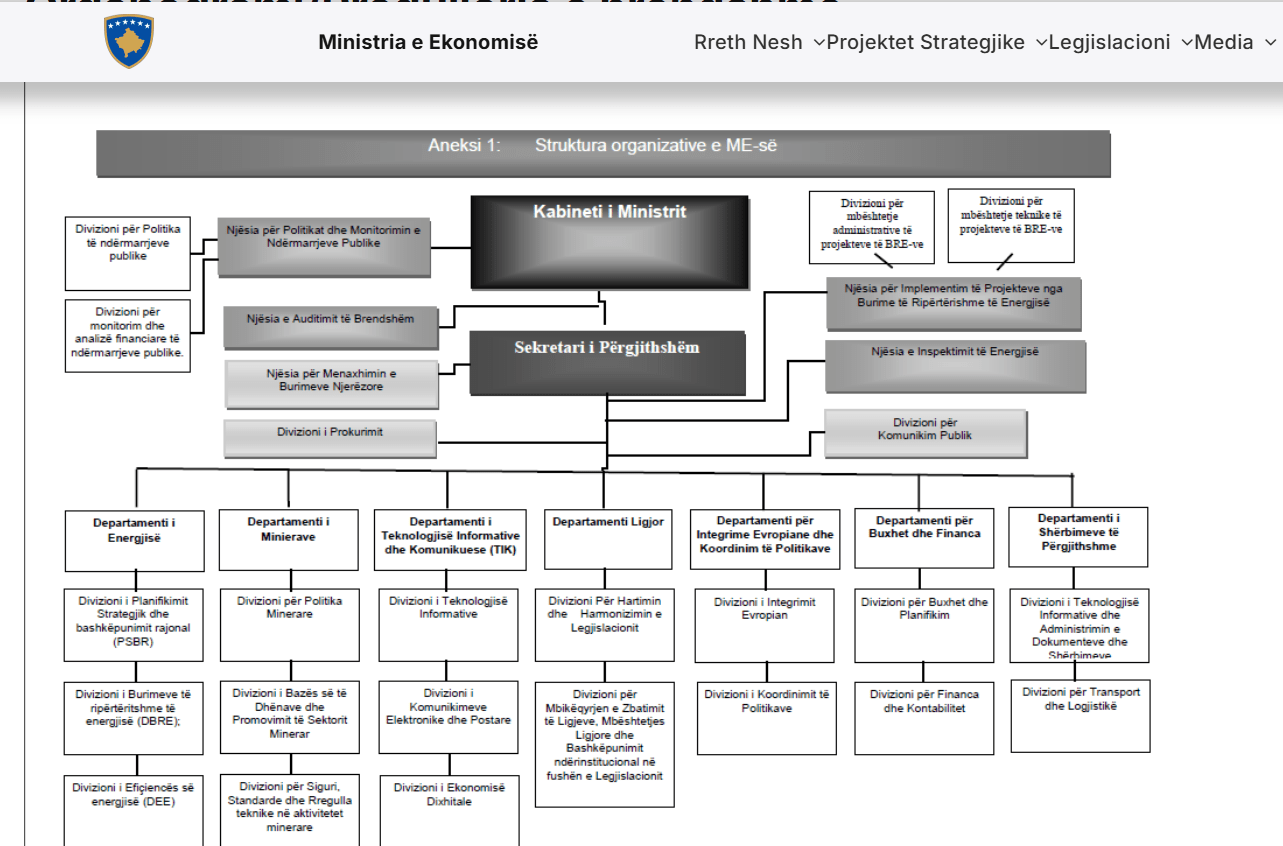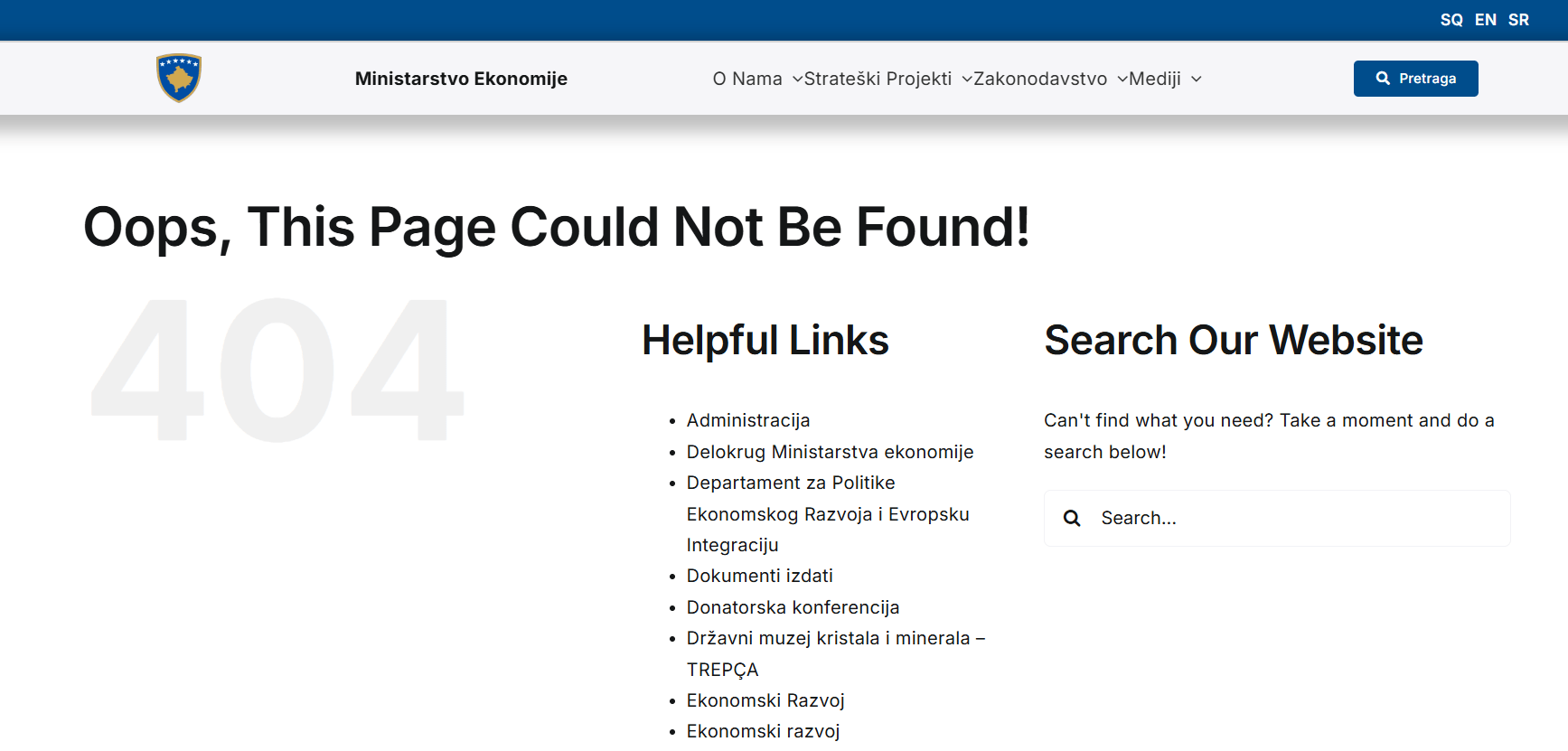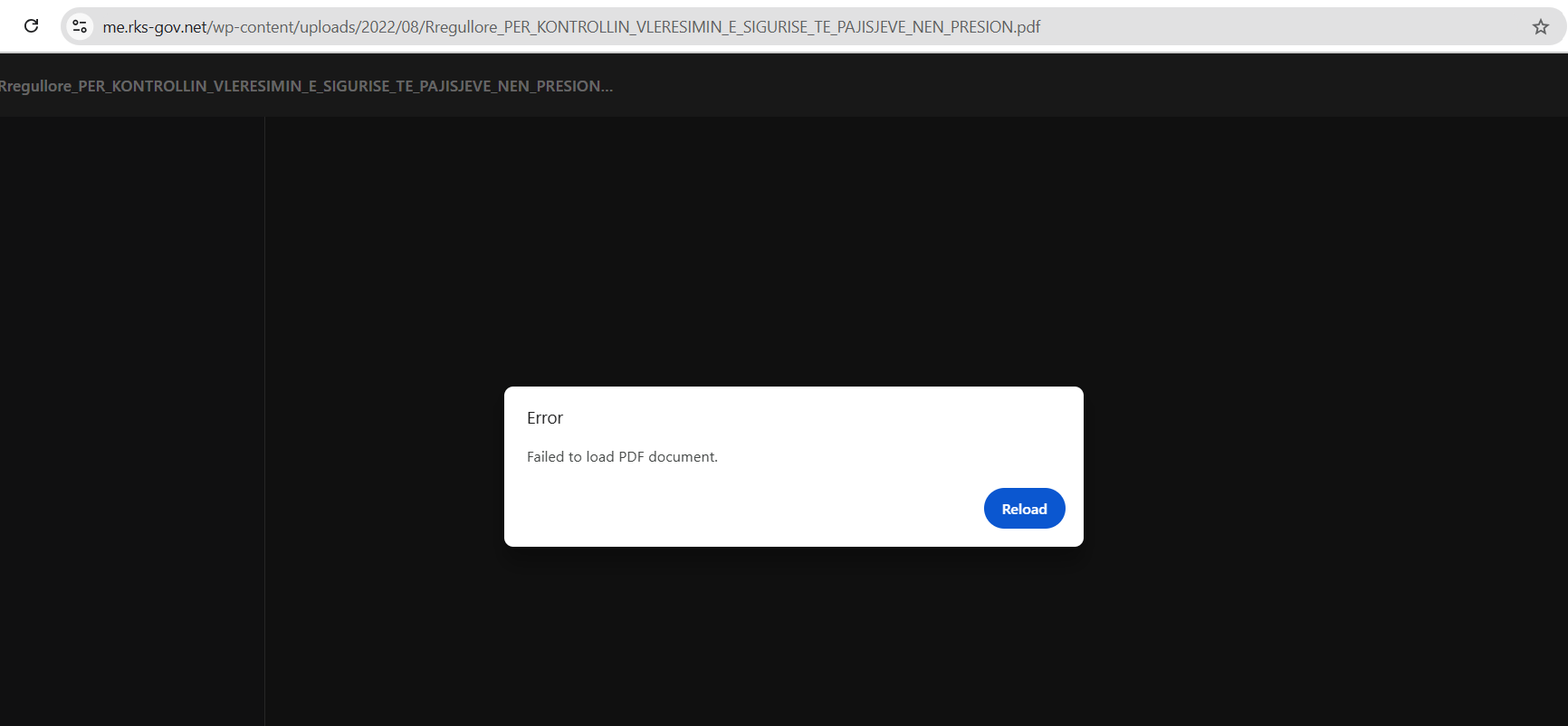Inconsistency of content between the Albanian and Serbian versions of the site, poor translation, as well as the lack of key documents in the Serbian language — including administrative instructions, legal acts and employment applications, is the conclusion after analyzing the official website and social networks of the Ministry of Economy. The problem of inconsistent content is not limited to the written form, but the video materials are also predominantly in the Albanian language, while information in Serbian is kept to a minimum.
The systemic violation of the Law on the Use of Languages in Kosovo has been highlighted for years, yet it persists despite the existing legal framework[1] that guarantees equal use of both Serbian and Albanian. As a result, non-majority communities, particularly those who speak Serbian — continue to be denied access to essential public information. This concern was also noted in the European Commission’s 2023 Report[2] on Kosovo, where multiple sections emphasize this problem.
Therefore, NGO Aktiv, Radio Kim, New Social Initiative (NSI), Radio Gorazdevac, and the Advocacy Center for Democratic Culture (ACDC) continue their public advocacy campaign, urging institutions to address this long-standing issue. This week’s focus is on the Ministry of Economy. Upon reviewing its website and social media accounts, we found that the same pattern persists: the presence of Serbian is minimal, even though it is, alongside Albanian, an official language in Kosovo.
Respecting the use of the Serbian language within the Ministry of Economy goes beyond a mere administrative obligation, it is a fundamental issue that directly affects constitutional principles, the functionality of the public system, and the socio-economic cohesion of society. Inadequate implementation of bilingualism creates systemic barriers that undermine the principles of equality, transparency, and legal certainty for all citizens, particularly those who communicate in Serbian. Failure to uphold legal and constitutional language provisions results in a significant imbalance in access to essential information and public resources. For example, access to information on economic opportunities and state support becomes selective.
The lack of comprehensive information in Serbian regarding subsidy calls, support programs for small and medium-sized enterprises, incentives, or specific investment regulations effectively excludes a significant portion of the population from active participation in economic life. Moreover, this issue also affects the transparency of public employment processes. Insufficient bilingual communication in job announcements, position descriptions, and application forms on official platforms discriminates against Serbian-speaking applicants, limiting their access to public sector jobs. This not only undermines the principle of equality but also denies institutions the opportunity to attract the most qualified candidates from all communities.
What we found on the website of the Ministry of Economy?
Deputy Ministers[3]: The Serbian version of the website omits information about one deputy minister, which is available on the Albanian version.
Organizational Chart[4]: The organogram is available only in the Albanian version, while it is completely missing from the Serbian version.
Inconsistent Content: In the section[5] “Inter-Ministerial Commission for Public Enterprises”, the Serbian version contains significantly less information compared to the Albanian version.
Poor Translation: The sectiona[6] titled “Inter-Ministerial Commission for Privatization – PE” is not only poorly translated into Serbian, but also lacks any content in the Serbian version, unlike the Albanian version which provides complete information.
Central Public Enterprises[7]: In this category, the violation of the Law on the Use of Language is clearly visible, since the Serbian version of the site, unlike the Albanian version, which contains extensive information, does not contain any content other than the title itself.
“Public Enterprises and Regional Irrigation”[8]: This section is not only poorly translated into Serbian but also lacks any content in the Serbian version of the site. In contrast, the Albanian version contains detailed information about regional water utilities.
Geological Service of Kosovo[9]: Another example of inconsistency, the Serbian version omits the decisions section, which is fully presented on the Albanian version.
Energy Inspectorate[10]: The identical situation is present here as well, since the content is not harmonized between the language versions of the site, because the Albanian version provides significantly more information compared to the Serbian one, in which the data is limited.
“RES” Project (Renewable Energy Sources)“[11]: A further case of misalignment, although many headings are listed in Serbian, the associated links are not functional. Meanwhile, the Albanian version includes comprehensive details across all project segments.
Strategic Documents[12]: The “Strategic Documents” category is one of the clearest examples of a violation of the Law on the Use of Languages and content inconsistency between the Serbian and Albanian versions of the website. While the Albanian version offers 29 documents, only 13 are available in Serbian. Notably, the most recent annual report by the Ministry available in Serbian dates back to 2016.
Employment Application: Although titled in Serbian, this document is not accessible on the website, making it impossible for Serbian-speaking applicants to obtain the necessary information to apply for employment.
Projects[13]: This is another example of inconsistency between the Serbian and Albanian versions of the site. Numerous project-related documents, studies, potential assessments, and promotional materials are available exclusively in Albanian. On the Serbian version, many are missing or limited to titles only.
Publications[14]: Unlike the Albanian version of the site, the Serbian version lacks a document related to the action plan for renewable energy sources.
Energy Efficiency and Renewable Energy Project[15]: This project represents one of the most serious examples of violation of the Law on the Use of Languages. Documents related to project drafts, management, decisions, and public consultations are entirely missing from the Serbian version, while they are fully available in Albanian. Furthermore, the Albanian section includes essential information about the projects, partners, development goals, recommendations, and implementation, which is absent from the Serbian version.
Projects of Interest within the Energy Community[16]: This category shows an identical pattern of violations of the Law on the Use of Language as the previously mentioned category. In the Serbian version of the site, the subcategories contain only titles and two links, one of which is incorrect[17]. In contrast, in the Albanian version of the site, all documents and subcategories are properly accessible and functional.
Secondary Legislation[18]: This category also reveals discrepancies. While two documents are available in Albanian, only one appears in Serbian, missing the document titled “Ethical Code of Governance for Public Enterprises”.
Administrative Instructions[19]: Another drastic example of the mismatch of documents in both official languages. Namely, in the Serbian part of the site, out of dozens of attached document titles, only two are functional, while in the Albanian version almost every document is available.
Regulations[20]: Of the four documents listed in the Serbian version, two are unavailable, whereas the Albanian version includes seven documents that are fully accessible.
Mining[21]: Documents related to mining laws, administrative instructions, regulations, and decisions are almost entirely missing from the Serbian version, while all relevant materials are properly listed and functional in the Albanian version.
Legislation – ICT[22]: This category also reflects the same practice. A substantial disparity is evident between the documents provided in the Serbian and Albanian versions.
Video Gallery[23]: This category also shows a significant disparity in content availability between language versions of the site. More than a dozen video materials are attached in the Albanian language, while only seven are available in the Serbian version. Moreover, three of those seven videos are subtitled in Albanian.
Social Media
Facebook[24]: When it comes to the Ministry of Economy’s presence on the Facebook platform, it has been observed that the Law on the Use of Languages is only partially respected. The page title appears exclusively in Albanian, and an analysis of posts and activity shows that the practice of bilingual communication is not consistently applied. This issue is particularly evident with video content, nearly all videos are published exclusively in Albanian, both in their titles and in the spoken content. An exception is found in a few videos related to northern Kosovo, which include Serbian subtitles.
X (formerly Twitter): The situation is even worse on the X platform[25]. Nearly all posts, including the ministry’s full name, are available only in Albanian and in a non-official language of Kosovo, English. Serbian is entirely absent, with not a single post or indication of content in the language.
YouTube[26]: When it comes to the official YouTube channel of the Ministry of Economy, there is an almost complete absence of content in the Serbian language, which is another serious example of a violation of the Law on the Use of Languages. Almost all the attached video material is published exclusively in the Albanian language, both in the spoken content itself and in the descriptions below the video. Additionally, none of the videos contain translation or subtitles in Serbian.
Why is this important?
Although previous two analyses have identified examples of good practices in implementing the Law on the Use of Languages, this monitoring shows that such cases remain the exception rather than the rule. On the contrary, the prevailing pattern reveals a systematic disregard for the obligation to equally use the Serbian language in the work of Kosovo institutions. This analysis confirms that Serbian continues to be treated as secondary, or even non-existent, in many segments of public communication, directly violating the language rights of Kosovo citizens who use Serbian. Such practices prevent equal access to information for non-majority communities and constitute a clear breach of the Law on the Use of Languages
This law clearly stipulates that Albanian and Serbian are equal official languages in Kosovo. Yet, years of neglect and silence regarding continuous violations of language rights have deprived Serbian citizens and other non-majority communities, who rely on information in Serbian, of their constitutionally and legally guaranteed right to equal access to public information.
Therefore, it is crucial to replace the use of unqualified translators or automatic tools like Google Translate with certified professionals who can ensure accurate and unambiguous translations into Serbian. Establishing a functional translation system will ensure uninterrupted access to public information and, more importantly, demonstrate that institutions are committed to upholding not only language rights but also fundamental human rights, including the rights of non-majority communities, as guaranteed by the Universal Declaration of Human Rights[27].
While non-governmental organizations, despite limited resources, regularly ensure trilingual presentation of their activities, Kosovo institutions, including the Ministry of Economy, with significantly larger budgets and capacities, have undoubtedly had the means to provide adequate translation into Serbian.
Therefore, we call on the Ministry of Economy to immediately begin the process of aligning the language versions of the information published on its website and social media, and to ensure equal access to information in both official languages.
We also once again urge the Office of the Prime Minister to move beyond political rhetoric without tangible results, to abandon merely declarative commitments to the rights of non-majority communities, and to instruct institutions to harmonize language standards at all legally mandated levels.
At the same time, we appeal to the Office of the Language Commissioner to begin implementing the legal provisions within its competencies. This includes building an institutional environment that respects constitutional and legal obligations and that protects, promotes, preserves, and enforces the language rights of all Kosovo citizens.
Once again, we encourage all citizens to actively engage in this process and report any observed language irregularities to the relevant institutions, such as the Office of the Language Commissioner (zkgj.kpj@gmail.com) and the Ombudsperson Institution (info.oik@oik-rks.org). We also invite citizens who come across specific language violations to contact NGO Aktiv (office@ngoaktiv.org) and join our call to the responsible institutions to uphold legally prescribed standards.
[1] https://kryeministri.rks-gov.net/wp-content/uploads/2022/05/ZAKON_BR._02_L-37_O_UPOTREBI_JEZIKA1346.pdf
[2] https://enlargement.ec.europa.eu/document/download/c790738e-4cf6-4a43-a8a9-43c1b6f01e10_en?filename=Kosovo%20Report%202024.pdf
[3] https://me.rks-gov.net/sr/zamenici-ministara/
[4] https://me.rks-gov.net/organogrami/
[5] https://me.rks-gov.net/njpmnp/sr/inter-ministarskoj-komisiji-za-jp/
[6] https://me.rks-gov.net/njpmnp/sr/medjuministarski-komisiji-za-privatizaciju-jp/
[7] https://me.rks-gov.net/njpmnp/sr/centralna-javna-preduzeca/
[8] https://me.rks-gov.net/njpmnp/sr/javna-preduzeca-i-regionalnog-navodnjavanje/
[9] https://me.rks-gov.net/sr/geoloska-sluzba-kosova/
[10] https://me.rks-gov.net/sr/inspektorat-za-energetiku/
[11] https://me.rks-gov.net/sr/strategija/
[12] https://me.rks-gov.net/bre/
[13] https://me.rks-gov.net/bre/
[14] https://me.rks-gov.net/bre/
[15] https://me.rks-gov.net/projekti-i-kosoves-per-eficience-te-energjise-dhe-energji-te-riperteritshme/
[16] https://me.rks-gov.net/sr/projekti-od-interesa-u-okviru-energetske-zajednice-peci/
[17] https://www.spp-ks.net/
[18] https://me.rks-gov.net/sr/podzakonski-aktovi-doneti-od-ministarstvo-ekonomskog-razvoja/
[19] https://me.rks-gov.net/energjia-2/
[20] https://me.rks-gov.net/sr/energia/
[21] https://me.rks-gov.net/sr/rudnici/
[22] https://me.rks-gov.net/sr/ikt/
[23] https://me.rks-gov.net/sr/video-galerija/
[24] https://www.facebook.com/MinistriaeEkonomise/?locale=hr_HR
[25] https://x.com/EconomyRks
[26] https://www.youtube.com/@ministriaeekonomiseme2700/videos
[27] https://www.ohchr.org/en/human-rights/universal-declaration/translations/serbian-latin-srpski












